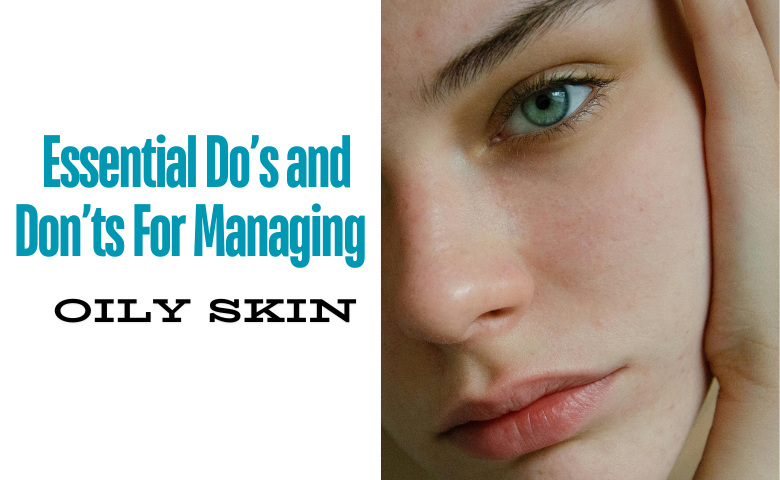
Is your skin oily? Do not worry! You might be surprised to hear that oil has certain skin-health benefits. Those with oily skin tend to have thicker, less wrinkled skin, and naturally occurring oil can help protect skin. Oily skin does not become an issue until the oil equilibrium in your skin is disrupted, causing pore blockage and subsequent acne breakouts.
Table of Contents
Consequently, what steps can you take to keep your oil levels in a healthy range? Read out these essential do’s and don’ts for managing oily skin.
The Do’s For Skincare are:
1. Do: Cleanse Your Skin Twice Daily
Regular cleansing is paramount in controlling oily skin. Opt for a gentle, foaming cleanser that removes dirt, makeup, and excess oil without stripping your skin of its natural moisture. Cleansing in the morning removes the oil that accumulates overnight, and cleansing at night eliminates impurities gathered throughout the day. Overwashing can trigger your sebaceous glands to produce more oil, so stick to a twice-daily regimen.
2. Do: Use a Toner
Incorporating a toner into your skincare routine can help to balance your skin’s pH levels and remove any residual cleanser or makeup. Look for toners with ingredients like witch hazel or tea tree oil, which are known for their astringent properties. These can help tighten pores and reduce oiliness. However, avoid alcohol-based toners as they can dry out your skin, prompting it to produce more oil.
3. Do: Stay Stress-Free
Stress can cause hormonal fluctuations that increase oil production and exacerbate acne. Engage in stress-relieving activities such as yoga, meditation, or regular exercise. Ensuring you sleep enough each night helps keep stress levels in check and maintain healthy skin.
4. Do: Exfoliate Regularly
Regular exfoliation helps remove dead skin cells that can clog pores and lead to breakouts. Use a gentle exfoliant 2-3 times a week for oily skin. Products containing alpha hydroxy acids (AHAs) or beta hydroxy acids (BHAs) are particularly beneficial. These chemical exfoliants penetrate the skin, dissolving dead skin cells and reducing the likelihood of acne.
5. Do: Consult a Dermatologist
If you struggle to manage oily skin despite following these guidelines, it may be beneficial to consult a dermatologist. A skincare professional can provide personalized advice and recommend treatments tailored to your needs. They can also prescribe topical or oral medications to help control oil production and prevent acne.
6. Do: Use Oil-Free and Non-Comedogenic Products
Selecting the right skincare and makeup products is vital for managing oily skin. Always choose oil-free and non-comedogenic products to prevent clogged pores and acne. Non-comedogenic means the product is formulated to avoid blocking pores. This applies to everything from moisturizers and sunscreens to foundations and powders.
7. Do: Incorporate Clay Masks
Clay masks are excellent for absorbing excess oil and deep-cleaning your pores. Use a clay mask once or twice weekly to help manage oily skin. Bentonite and kaolin clays are particularly effective at drawing out impurities and controlling shine. Apply the mask to clean the skin, leave it on for the recommended time, and rinse thoroughly.
8. Do: Blot Excess Oil
Blotting papers are a lifesaver for controlling shine throughout the day. They help absorb excess oil without disturbing your makeup. Keep a pack handy and gently press a sheet against your skin whenever you notice excess shine. This quick fix can help maintain a matte appearance without overloading your skin with more products.
9. Do: Keep Your Hair Clean
Oily hair can contribute to an oily complexion, especially if it falls onto your face frequently. Wash your hair regularly with a mild shampoo to keep oiliness at bay. Avoid using heavy conditioners near your scalp and opt for lightweight, volumizing products. Keeping your hair clean and off your face can significantly reduce oil transfer to your skin.
10. Do: Use Sunscreen Daily
Sunscreen is a must for all skin types, including oily skin. Exposure to the sun can lead to increased oil production and exacerbate acne. Choose an oil-free, non-comedogenic sunscreen with broad-spectrum protection. Gel-based sunscreens are suitable for oily skin, protecting without a greasy residue.
11. Do: Maintain a Healthy Diet
Your diet can significantly impact your skin’s oil production. Incorporate plenty of fruits, vegetables, and whole grains into your meals. Foods rich in omega-3 fatty acids, such as salmon and walnuts, can help reduce inflammation and balance oil production. Stay hydrated by drinking plenty of water, as dehydration can lead to increased oiliness. Here you can read more about Diet Tips for Reducing Oily Skin.
The Don’ts For Skincare are:
1. Don’t Use Heavy Makeup
Heavy, oil-based makeup can clog pores and lead to breakouts. Opt for lightweight, oil-free makeup products designed for oily skin. Mineral-based foundations are a great option as they absorb excess oil and provide a natural matte finish. Additionally, look for makeup products labeled as non-comedogenic to ensure they won’t block your pores.
2. Don’t: Touch Your Face Frequently
Touching your face mostly transfers dirt, bacteria, and oil from your hands to your face, increasing the risk of breakouts. Make a conscious effort to avoid touching your face throughout the day. If you need to touch your face, ensure your hands are clean to minimize the transfer of impurities.
3. Don’t Consume Excessive Sugar and Dairy
High sugar and dairy intake can trigger hormonal imbalances, increasing sebum production and acne. Limit your consumption of sugary snacks, sodas, and dairy products. Opt for healthier alternatives like fruits, nuts, and plant-based milk to keep your skin clear and healthy.
4. Don’t: Sleep with Makeup On
Never sleep with makeup on, as it can clog your pores and lead to breakouts. Ensure you thoroughly remove all makeup before bed. Use a gentle makeup remover or micellar water followed by your regular cleansing routine. This practice prevents acne and allows your skin to repair and regenerate overnight.
5. Don’t Use Heavy Hair Products
Heavy hair products like pomades and oils can transfer to your skin and clog your pores. Choose lightweight, non-greasy hair products to minimize the risk of breakouts. If you use styling products, apply them sparingly and keep them away from your face.
6. Don’t: Over-Exfoliate
While exfoliation is crucial, overdoing it can irritate your skin and increase oil production. Stick to the recommended frequency and avoid using multiple exfoliating products simultaneously. Over-exfoliation can strip your skin of essential oils, leading to an overactive response from your sebaceous glands.
7. Don’t Leave Masks On for Too Long
Leaving masks on too long can dry out your skin and increase oil production. Follow the instructions on the product packaging and avoid exceeding the recommended duration. Over-drying your skin can trigger a compensatory response from your sebaceous glands, producing more oil.
8. Don’t Use Harsh Soaps or Scrubs
Avoid harsh soaps and abrasive scrubs. These can irritate your skin, leading to increased oil production. Instead, select a mild cleanser containing salicylic acid, glycolic acid, or benzoyl peroxide. These ingredients help to gently exfoliate the skin, keeping pores unclogged and reducing the occurrence of blemishes.
9. Don’t Neglect Your Mental Health
Neglecting your mental health can have a direct impact on your skin. High-stress levels can lead to increased oil production and breakouts. Make time for self-care and seek support if you’re feeling overwhelmed. A balanced mind contributes to a balanced complexion.
10. Don’t Skip Moisturizer
It might seem counterintuitive, but even oily skin needs hydration. Skipping moisturizer can lead your skin to produce even more oil to compensate for the lack of moisture. Choose a lightweight, oil-free, non-comedogenic moisturizer. Gel-based or water-based formulations are excellent, providing necessary hydration without a greasy feel.
11. Don’t: Self-Medicate
Avoid self-medicating with over-the-counter products without proper guidance. Some products may not suit your skin type and could exacerbate your issues. Always seek professional advice before starting new treatments or medications.
Here you can learn an Informative Guide To Understanding the Causes of Oily Skin.
In conclusion, managing oily skin involves a delicate balance of maintaining proper hydration, cleansing, and using the right products. Following these essential dos and don’ts can keep your skin clear, healthy, and shine-free. Patience and persistence, combined with a tailored skincare routine, will ultimately lead to a more balanced complexion.
